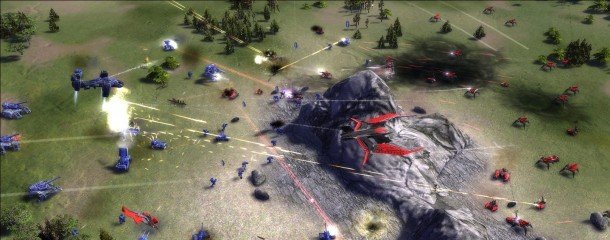Stardock founder on the future of RTS. (Hint: It's not death)

The smoke had barely cleared from Evan and T.J.'s Face Off over the future of the RTS genre before readers and industry folks began sounding off on the matter. In a blog post , Stardock founder Brad Wardell claims the demand for RTS games still exists—it's just pent up from the wait "the adoption of the hardware to implement the next-generation RTS designs."
"It's easy to forget how closely tied video game innovation is to the technology that it runs on top of," Wardell writes. "We didn't even have first-person shooters until Castle Wolfenstein 3D because the computing horsepower wasn't there. The hardware drove the creation of an entire new genre of game."
According to Wardell, the primary bottleneck keeping RTS developers from innovating on their designs is the 2GB memory limitation of 32-bit games straining the need for rendering hordes of units on-screen. He compares the visual chops between Demigod and Supreme Commander, saying the former benefits from improved graphics simply because MOBAs—a sub-genre of RTS—"don't have to deal with hundreds of independent units running around at once which reduces memory use."
Though Wardell says it's "technically possible" for an RTS game to boast massive scale, hundreds of units, and razor-sharp graphics, the profitability of such a game isn't likely to be high because of hardware limits. "Their design requirements revolve around a player with DirectX 11, a 64-bit Windows OS and 4 cores (minimum)," he states. "They could do their innovative design with much lower visual fidelity and get most of what they want, but then it becomes a budget title."
Still, Wardell thinks "breathtakingly beautiful" RTS games aren't a total pipe-dream. He predicts a boom for the genre when 64-bit systems and a DirectX 10-compatible videocard are considered to be low-end on the hardware scale. "Once that has become mainstream, it'll be a race by studios to position themselves," he writes, citing Uber's Planetary Annihilation as a possible vanguard of the new, heavier breed of RTS offerings.
"The RTS game concept is compelling," Wardell concludes. "It works as a single-player experience and can be played as a multiplayer game. Gamers want these games. They'll pay for these games. But they also have to be measurably superior than what's already out on the market. To do that, the hardware has to catch up. The good news is that it's almost ready."
The biggest gaming news, reviews and hardware deals
Keep up to date with the most important stories and the best deals, as picked by the PC Gamer team.
Omri Petitte is a former PC Gamer associate editor and long-time freelance writer covering news and reviews. If you spot his name, it probably means you're reading about some kind of first-person shooter. Why yes, he would like to talk to you about Battlefield. Do you have a few days?


